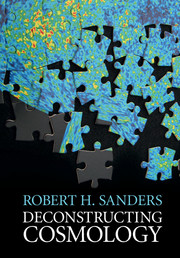Book contents
3 - The Very Early Universe: Inflation
Published online by Cambridge University Press: 12 October 2016
Summary
Fine-Tuning Dilemmas and the Initial Singularity
The basic scenario of the Big Bang was in place by 1970. It was generally accepted that the Universe was once much hotter and denser and more homogeneous than at present. There was an origin of the world at a definite point in the past more than 10 billion years ago, and the light chemical elements, primarily helium, were synthesized in the hot early history of the cosmos. These were the essential aspects of what was becoming the standard scientific cosmological model. There were, however, several problems in principle with the Big Bang – issues that were not so much phenomenological as aesthetic – basically problems of naturalness.
In 1970 Robert Dicke emphasized that there are fine-tuning problems in the FLRW models for the Universe. Why is it, for example, that the density in the present Universe is so nearly equal to H02/G, where H0 is the present value of the Hubble parameter and G is the constant of gravity (H varies with time – it is not a true constant)? In other words, why should the present density be so close to the critical density for a flat universe if it is not, in fact, precisely the critical density?
This question arises because of the nature of the Friedmann equations. The measure of the average density of the Universe is typically given in terms of the critical density and is designated as Ω. This parameter also varies with cosmic time, but if Ω is greater than, less than or equal to one, it is always so (the curvature of the Universe cannot change with time). The value of the density parameter at the present epoch is Ω0 (analogous to the Hubble parameter H0), so Ω0 = 1 (implying a density of about 10-29 grams per cubic centimeter at present) exactly corresponds to the flat FLRW universe that asymptotically expands forever. The problem is that for Ω0 to be close to one but not one requires incredible fine-tuning of the density in the early Universe. If, for example, Ω0 = 0.05, then at the time of nucleosynthesis, when the temperature of the black body radiation is on the order of 10 billion degrees, the density parameter of the Universe could not deviate from one to within several parts in ten billion; for earlier epochs (higher energies) this tuning problem becomes more severe.
- Type
- Chapter
- Information
- Deconstructing Cosmology , pp. 28 - 36Publisher: Cambridge University PressPrint publication year: 2016



